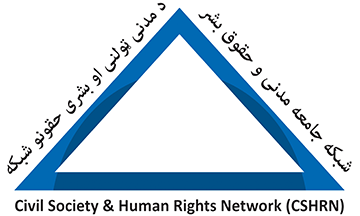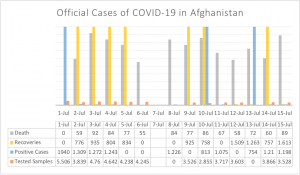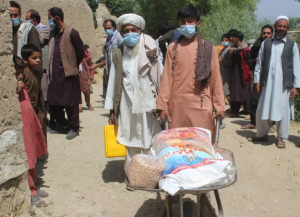Bi-weekly Situation Report
No. 12 (July 01, 2021 – July 15, 2021)

Civil Society and Human Rights Network
Purpose:
This bi-weekly report describes the updates and challenges related to the government’s relief response program, known as Dastarkhan-e-Meli, and health assistance in combating Covid-19 in Afghanistan.
Time Coverage: The report covers all the measures undertaken from July 01 to July 15, 2021, by the government in Afghanistan concerning health and humanitarian assistance during the Covid-19 pandemic.
Situation Overview:
- Covid-19 New Update: The third wave of the Covid-19 pandemic put in place tremendous health crises. The positive cases and death toll are on the rise while health services are limited. The health institutions and hospitals are suffering from poor facilities and mismanagement, undermining the efforts to mitigate the effects of the pandemic across the provinces. The graph below shows the rising Covid-19 positive tests and loses during the first half of June 2021 across Afghanistan. However, due to lack of data and documentation, the actual number is expected to be much higher.

Amidst the third wave of the pandemic, people in most provinces are suffering from poor health services. In the meanwhile, the COVID-19 hospitals across the provinces provide insufficient and poor health services. In several provinces, including Balkh, Herat, Kabul, Jawzjan, Ghor, people are suffering from lack of oxygen. Likewise, the price of oxygen increased several times higher than the normal price before. For example, one balloon of 40 Kg oxygen is between 2000 AFNs to 5000 AFN while the same balloon was previously available for 500 AFNs only. Poor individuals tested positive are not able to afford oxygen balloons, putting them at high risk of health crisis.
- Challenges in implementation of Datarkhan-e-Melli:
In most provinces, the Dastarkhan-e-Meli program has been suspended due to both lack of budget and growing insecurity as most districts have recently fallen under the control of the Taliban. However, amidst the fresh wave of violence across the country, on July 5, 2021, around 678 families in Qarotak-e-Markazi, Qaleh-e-Sefid, Badam-ali, and Uchuni development councils in Kapisa province have received food items provided by the Dastarkhan-e-Meli program. Additionally, on July 8, 2021, around 749 families across six development councils, such as Rajab Khankhel, Divaneh Khel, Firuzi, Bahauddin Khel, Kohneh Qaleh, and Ghani Khel in Kapisa have been provided food commodities.